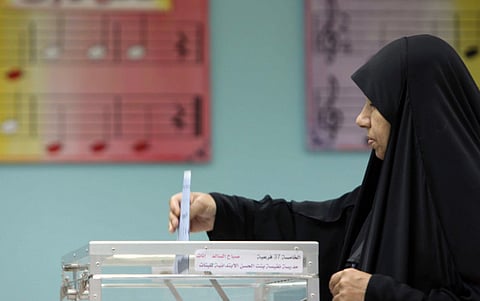Thousands vote in Kuwait polls despite boycott call
First and third districts see a strong turnout

Kuwait City: In defiance of a mass elections boycott staged by the opposition, thousands of Kuwaitis went to the polls in the country’s five districts, with minorities and previously under-represented groups taking advantage of the opportunity to participate.
“Why are we participating? In obedience to Baba Sabah”, said a woman voter in a face veil in the fifth district, referring to the Emir Shaikh Sabah Al Ahmad Al Sabah. “But also because our tribe is small, and it never gets the chance to enter parliament”.
Election centres, schools across the country, were lined up with campaign desks for the candidates. Supporters wore shirts branded with their candidate’s portrait and slogan, giving out flyers to voters till the last minute.
In the schools, citizens checked to see if their names were listed as registered voters, before heading to the appropriate room to cast their ballots. Once a ballot was caste, the judge presiding over the elections would read out the citizen number and name of the voter to representatives of the candidates sitting across. One judge said it helped candidates to know which citizen had voted “so they can urge those who did not vote to do so”.
The first and third districts saw a strong turnout by the afternoon. The fifth district, however, saw a relatively low turnout. Among voters, there was a heavy presence of the middle class, the Shiite minority and relatively small tribes.
The elections are taking place amid deep political divisions in the country that have spilled over into society following a controversial emiri decree reducing the number of candidates a voter can elect from four to one.
The government argues that the move would result in a fairer and more representative parliament, preventing coalition forming and in turn giving opportunities to those who have been pushed out of the political system by stronger political players. The opposition, made up of Islamists, large tribes and some liberals, has slammed the move as an attempt by the emir to monopolise power.
Kuwaiti state television had been broadcasting documentaries about the country’s democratic history and reports about voter enthusiasm for the elections in both English and Arabic.
“The divisions in society are very deep, and I am very worried for the country,” said Yousef Al Ebrahim, whose brother Abdul Amir is running for parliament for the second time. “Even in schools, children are asking each other whether they are with or against the elections”.
Those who voted stood firmly to their positions that political participation, and not street protests, is the right way to get out of the country’s crisis, many expressed deep concern about where the country was heading, given that a major political force had been left out of the political process.
“I would not be surprised if we see further violent confrontations,” said Fahd Abdul Rahman, from the first district. “I support the opposition’s right to boycott the vote, but don’t support their right to pressure people to boycott and rip campaign posters”.
Some voters said they had been under intense pressure to boycott the elections by family and friends. The crisis, said one voter, had created divisions even within families.
“We are the majority,” said a voter in the first district. “A silent majority. Just because we haven’t taken to the streets and made noise does not mean that we don’t exist”. He said that there was a need bring new faces into parliament and bring in a people who will challenge Islamists “who want to eliminate anyone who is not like them”.
Many expressed alarm at the make-up of the parliament that was elected in February this year, in which the opposition had a heavy presence. “In the fifty-nine years of my life, I had never felt the difference between urban and bedouin, Sunni and Shiite. But this last parliament was racist, and it wanted to create divisions in the country,” said a woman in the fifth district.
Some voters, particularly those in the First district, were confident that turnout would be high in the elections, but others acknowledged that the next parliament would not be fully representative of the Kuwaiti population. “It would be good if we get a 35 per cent turn out,” said Al Ebrahim.
Another, who did not want to disclose his name, said: “This parliament will be representative. It will represent those who care about this country. Those who will not be represented have no one to blame but themselves.
Sign up for the Daily Briefing
Get the latest news and updates straight to your inbox



